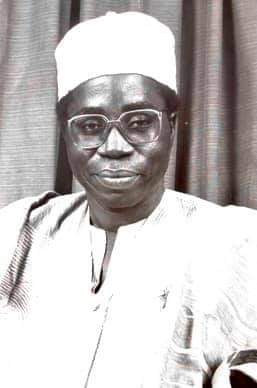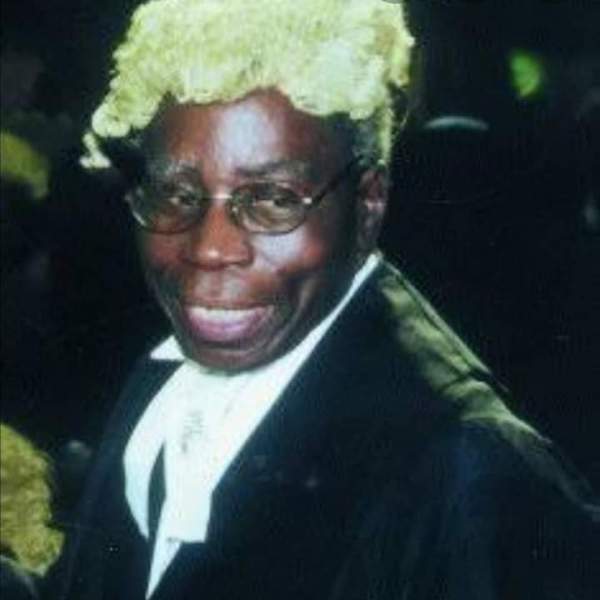Cerebral, vocal, erudite, sharp-witted, he liked to be called “Uncle Bola Ige”.
He wrote a regular column titled ‘Politicus’ in the Nigerian Tribune newspaper
He was aptly dubbed by another brilliant writer, Dr. Yemi Ogunbiyi, as “the Cicero of Esa Oke”. He told the rib-cracking story of ‘Boiled Egg’. Ever since, the words boiled egg and the scenario he painted in the yarn have etched permanently in my memory. However, while ruminating on the life and times of the man with the golden voice on what would have been his 94th birthday, the larger image he built for himself, keeps be-clouding my thoughts.
Boiled Egg, according to him, was a story of an American lady, whom he once dallied with in the land of the Yankees. The lady would always stubbornly call him Boiled Egg, rather than Bola Ige.
Born James Idowu Ajibola Ige on September13, 1930, Uncle Bola was not a man of imposing frame. He even looked rather smallish and frail. But, what he lacked in size, he more than made up in brain and voice.
From a very young age, Uncle Bola had consistently displayed acumen and sagacity far beyond his age. Both Ibadan Grammar School where he met his friend, late Chief Olabisi Onabanjo, another brilliant mind, the Spirit behind Ayekooto column in the same Nigerian Tribune, and late Pa Emmanuel Alayande, and the University College, Ibadan, where he met the likes of Pius Okigbo, Wole Soyinka and other luminaries, he was a first class Classics student.
By age 32, he was elected the National Publicity Secretary of the best organized political party in Africa, the Action Group (AG), at its Jos Convention. This was the beginning of his political triumphs and travails ….and “the beginning of the end!”
The triumph of the Jos Convention did not realistically last long, before the elders of the party rose against the Leader, late Chief Obafemi Awolowo, over perceived high-handedness. The crisis that erupted was so monumental that the heart and flesh of the party were ruptured. While Pa Awolowo and 29 other lieutenants were rounded up and charged for treasonable felony, a grave criminal offence that can earn an accused upon conviction a life jail, Uncle Bola was clamped into a solitary detention somewhere in the Esan Division of the old Western Region.
He survived the tremors and eruptions of the First Republic, and when the military eventually struck and put an end to the life of the nascent republican democracy, he emerged, under the government of Brigadier Oluwole Rotimi in the Western Region, as first, the Commissioner for Lands and Housing, and later, Commissioner for Agriculture and Rural Development. Brigadier Rotimi, it will be recalled succeeded Brigadier Adekunle Fajuyi, who was assassinated by the mutineers along with the Head of State, General Aguiyi Ironsi, in July 1967.

Uncle Bola was generally acclaimed as a super performer as the Commissioner under the Military Government. He toured the whole Region, and established more farm settlements to complete the ones the government of late Pa Awolowo established in the 50s. He was successful in his drive to preserve the forests. He planted more economic trees and created more rubber tree plantations between Ijebu and Edo Divisions, before he left the government over an unresolved issue.
Uncle Bola continued his advocacy until 1976 when the Federal Military Government constituted the Constituent Assembly to fashion out a new constitution for the proposed Second Republic. He was a member of the Constitution Drafting Committee, (CDC) famously called the “49 Wise men”, by Gen. Olusegun Obasanjo’s first military administration.
With the lifting of ban on political activities in August 1978, he automatically became one of the leaders of the Unity Party of Nigeria (UPN) founded by the late Pa Obafemi Awolowo. Prior to the announcement of the party, like minds had been meeting nocturnally, under the aegis of the “Committee of Friends”. This was an advantage in mobilization of members for the young party. The road was tortuous, the terrain slippery, and most unsteady, but uncle Bola who, seemed to have been built for such, plodded on. He had his eyes on the top job of the old Oyo State and he set his mind, with rock solidity, towards achieving it. He then started his moves.
All political permutations and indices did not favour him, yet he persisted. First, he was from little known Esa Oke, in Ijesa North. Secondly, Ibadan zone alone was bigger than all the remaining zones; yet he was undeterred. Thirdly, the leader Pa Awolowo preferred late Archdeacon Alayande, yet Uncle Bola remained unbowed. He chose to face the delegates at the primaries.
Meanwhile, Uncle Bola had successfully moulded the “young Turks” in the party into a solid platform behind him. He had all the vibrant members on his side. Pa Alayande was helpless at the primaries. The primaries were conducted three times, and thrice, uncle Bola trounced his old School principal. He emerged, to the shock and dismay of Pa Awolowo, the leader and governorship candidate of the party in the old Oyo State.
He easily won the State governorship election held on July 28, 1979, defeating an old friend, Chief Richard Akinjide, an Ibadan Chief, who contested under the rival National Party of Nigeria (NPN).
His four year tenure as the governor of old Oyo State was marked with intelligent legacies and ground breaking developments. Apart from faithfully executing the four cardinal programmes of his party, UPN, he introduced a lot of novel ideas into governance. Till date, his idea culminated in the establishment of Federal Road safety Corps (FRSC)which he started with Maja-Maja in Ibadan with his friend and soul mate, Professor Wole Soyinka at the head. In the education sector, he established the four satellite campuses of the Polytechnic, Ibadan respectively in Esa Oke, Iree, Eruwa and Lanlate. Today the four campuses are now full-fledged polytechnics or colleges of technology. The Uncle Bola ‘children’, called ‘Young Pioneers’ with the never-seen-before calisthenics displays was also introduced to mobilize and encourage secondary school children. It was a golden era in the old Oyo State.
He lost his re-election bid under very ugly controversies. Sure, he was the candidate to beat, but the Ibadan mafia led by Chief Adisa Akinloye, the National Chairman of the NPN, were determined to produce an Ibadan son as the next governor by fair or foul means. The slogan then was ‘omo wa ni, e je o se’. The election was marred by violent skirmishes all over Ibadan , Ile Ife and elsewhere. At the end, despite the villainous efforts of the then Inspector General of Police, Mr. Sunday Adewusi, who was from Ogbomosho, a known antagonistic town to whatever UPN, Pa Awolowo and Bola Ige stood for, the entire votes of Ife/Ijesha district, a major block vote for uncle Bola had to be cancelled before, the marauding NPN with the Federal might could get a controversial majority vote to declare Dr. Omololu Olunloyo of NPN as the winner. Most naturally, the declaration of the results was greeted with violence of unimaginable proportion. With the violent protests rocking Oyo State, Ondo, (now Ondo and Ekiti) too started boiling, and in three months, the military struck once again. The final hammer on the last nail on the coffin of the Second Republic was landed. The republic collapsed.
Once the second republic collapsed in the New Year day of 1984, uncle Bola was back in detention. This time in Agodi Prisons in the instructions of Major General Muhammadu Buhari, the new Head of State. He was later released when General Ibrahim Babangida swept aside the Maj Gen Buhari’s regime in another palace coup on Sallah Day of 1985.
Uncle Bola thereafter refrained from any dealings with the military and their governments. Even friends, colleagues, and mentees who sought his help to get into government positions were rebuffed. And when the transition to civil rule initiated by the Gen. Babangida’s government kick started, he simply maintained a ‘siddon look’ stance, meaning he was just an observer.
But uncle Bola was to rouse from his political napping by the dastard injustice of the annulment and cancellation of the June 1993 Presidential election results by the same military government of Gen. Babangida. He couldn’t fathom why the results that were almost all collated and announced had to be cancelled and annulled. He jumped into his battle gear and moved into the trenches again .He confronted the military junta from all angles. He wrote articles. He spoke at different fora. He gave reasons why Nigerians should reject the military arbitrariness. He had done more, in the eyes of the military government, and he was again clamped into detention. This time in Markudi, Benue State, to cool his head. He was only released upon the sudden death of Gen. Sani Abacha and the assumption of power of Gen. Abubarkar Abdulsalam.
The new government of Abdulsalam extended the Olive branch to all the political detainees in the country. Uncle Bola Ige was one. He was released, although Bashorun M. K. O. Abiola didn’t live to enjoy the imminent freedom. He died during the process of negotiating his release. Bola Ige immediately joined his colleagues in the Committee of Afenifere, where he was the Deputy Leader to late Senator Abraham Adesanya to participate in the transition programme of the Abdulsalam government. The group wanted a national party, but could not work with some politicians who were used by the military to torment others. Therefore, the alliance with Peoples Democratic Party (PDP) and the All peoples Party (APP) failed. The group then formed the Alliance for Democracy (AD).
When the nominations for the presidential candidate of the party came, Uncle Bola signified his interest. He felt traditionally, he was the next person by the group’s unwritten code of seniority in chosen candidates, and he said so in many fora, that if late Pa Adesanya were to be interested, he would recoiled back into his shell, since he was his senior in politics. But the Hawks in the group had other ideas.
The charade and shenanigan that followed at the D’Rovan Hotels, Ibadan where the electoral college took place were never seen nor heard of before in the annals of the Awolowo’s politics in Yorubaland. Cheques and cash in suitcases, were freely traded. Unfortunately, uncle Bola Ige was away, outside the country, campaigning and mobilizing support for the group. He himself described the tragedy of D’Rovans as ‘the second fall of the son of man’. He took everything with untold equanimity and moved on.
He was appointed the first as the Minister of Mines and Power by the new government of Chief Olusegun Obasanjo and later was moved to the Ministry of Justice.
But sadly, in a drama yet untold till this day, in the late evening of December 23, 2001, the man with the golden voice, the orator, writer, educationist, polyglot, lawyer, administrator, politician, singer, composer, was coldly shot in the chest inside his bedroom at his Bodija Estate, Ibadan home, by yet to be identified sponsored assassins.
(To be continued)
www.esaoketodayonline.com ©2024)
